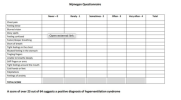Andy
Senior Member (Voting rights)
Abstract
Medically unexplained physical symptoms (MUPS) are symptoms without an identifiable organic cause that lead to functional impairment. MUPS is highly prevalent in general practice consultations. This pilot trial aimed to investigate the effectiveness and feasibility of a 5-week breathing retraining program focusing on basic anatomy and physiology, breathing awareness, nasal breathing and resonance (coherent) breathing for patients meeting the criteria for MUPS.
The trial used a quantitative design with pre- and post-intervention measurements. Fifteen participants with MUPS and dysfunctional breathing (assessed by the Nijmegen Questionnaire) were recruited from two general practitioner offices. The intervention consisted of 5 weekly sessions including education on breathing physiology and weekly breathing exercises focused on nasal breathing and resonance breathing techniques. One week post intervention, improvements were observed in dysfunctional breathing scores, lower symptom severity, higher general well-being, and reduced musculoskeletal pain complaints. At 3 months post-intervention, sustained improvements were seen in dysfunctional breathing, general well-being, musculoskeletal pain, and additionally lower pseudoneurological, gastrointestinal, and allergy complaints, as well as lower overall symptom burden and improved end-tidal CO2 levels.
The trial concluded that the 5-week breathing program showed promising results for improving multiple patient-reported outcomes in MUPS. Recruitment, adherence, and acceptability of the program were satisfactory. A randomized controlled trial is recommended to further evaluate the efficacy of this breathing intervention for MUPS patients.
Trial registration: ClinicalTrials.gov NCT06575920
Open access
Medically unexplained physical symptoms (MUPS) are symptoms without an identifiable organic cause that lead to functional impairment. MUPS is highly prevalent in general practice consultations. This pilot trial aimed to investigate the effectiveness and feasibility of a 5-week breathing retraining program focusing on basic anatomy and physiology, breathing awareness, nasal breathing and resonance (coherent) breathing for patients meeting the criteria for MUPS.
The trial used a quantitative design with pre- and post-intervention measurements. Fifteen participants with MUPS and dysfunctional breathing (assessed by the Nijmegen Questionnaire) were recruited from two general practitioner offices. The intervention consisted of 5 weekly sessions including education on breathing physiology and weekly breathing exercises focused on nasal breathing and resonance breathing techniques. One week post intervention, improvements were observed in dysfunctional breathing scores, lower symptom severity, higher general well-being, and reduced musculoskeletal pain complaints. At 3 months post-intervention, sustained improvements were seen in dysfunctional breathing, general well-being, musculoskeletal pain, and additionally lower pseudoneurological, gastrointestinal, and allergy complaints, as well as lower overall symptom burden and improved end-tidal CO2 levels.
The trial concluded that the 5-week breathing program showed promising results for improving multiple patient-reported outcomes in MUPS. Recruitment, adherence, and acceptability of the program were satisfactory. A randomized controlled trial is recommended to further evaluate the efficacy of this breathing intervention for MUPS patients.
Trial registration: ClinicalTrials.gov NCT06575920
Open access

